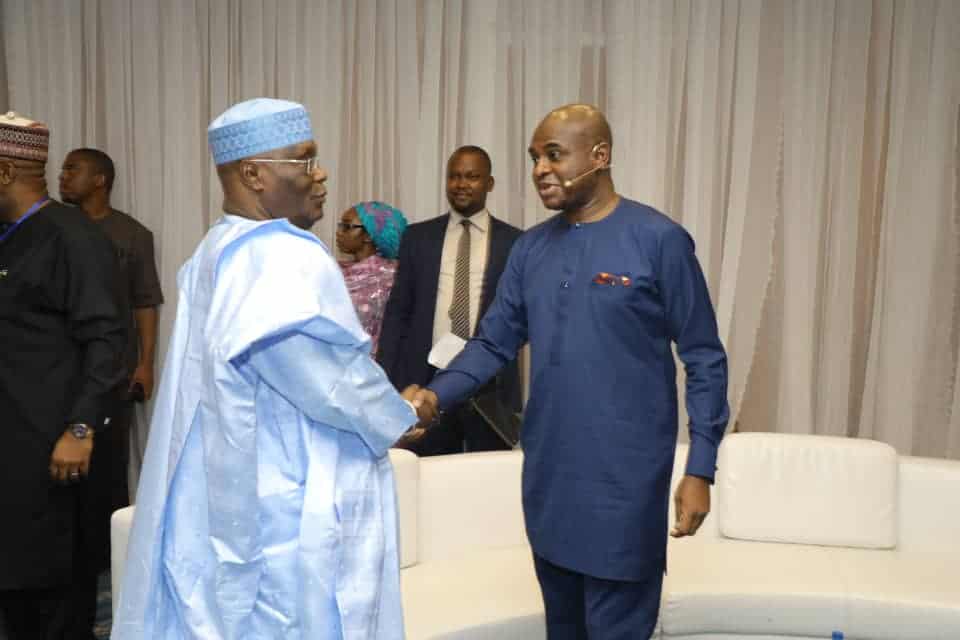AFRICA, Opinion
Nigeria: Why Debates Don’t Win Elections

PDD Flag-bearer Atiku Abubakar
Before the November 8th, 2016 American Presidential Elections, the arguments of best choice and popular candidates, though discussable, barely meant anything in the foray of ideal choice. In the American political space, candidates are basically judged by meaningful antecedents and strong character. Those who wish to occupy the revered American political offices must have good policies, sound in critical social and political thoughts.
The American public office seekers cut significant intelligence. The American Presidential Debate; a two-legged political fixture, does not just showcase the American political poetry. The aspirants, often drawn from the country’s two major political parties, use the opportunity to re-echo their political messages, and try to haggle their way into the hearts of the ever-demanding American electorate. Most US electorate long for the Presidential Debate because it affords them the opportunity to know the candidates and their policies.
It is a different, sad ball game in Nigeria. The average Nigerian politician is afraid of publicizing his or her real manifesto, fearing their opponents could capitalize on it, or use it against them. It is more of a tearful belief that it is sober anger. Debates in Nigeria are mostly left for fringe candidates if we must use that unfitting description. The bigwigs do not see debates as a real avenue. Take the case of the January 19th debate for Nigeria’s presidential candidates, organized by the Nigerian Elections Debate Group, NEDG, and the Broadcasting Organization of Nigeria, BON, that was inexcusably missed by the current president, and when candidate of the major opposition party dropped by and saw that the president had backed out, he towed similar pathway, both leaving the podium for candidates they deemed unlikely threats. Permit for the depressing phrase that in Nigeria, debates and floodlight dialogues do not bring anything to the table of political victory. Nigeria’s President and his handlers are not aliens to that pathetic reality; the President had missed a similar debate prior to the 2015 poll, and still went on to win the election. The thing is that those who are already in power and seeking re-election would rather stifle the electoral process, and rejig the marked dice into their corners. The opponents on their own parts are better of researching on how to outplay the holders. It is like a tasteless bowl game between two aimless opponents.
Disheartening it is that political parties with modest means are neglected in Nigeria, even when they put up the almost-right candidates, attend engaging local and international town hall forums, and sell credible proposals. It is always as though the electorate; the supposed-to-be key decision-makers in elections, is blindfolded, eyes away from these candidates and their political parties. But a country, whose ruling class does not avail itself of opportunities as imperative as a political debate, is destined for repetitive political errors and national failure. One argument that could be tabled as the reason for lack of social interest in political debates in Nigeria is fear; the fear of having failed the electorate, or the fear of self-conviction. It could be something else. Whatever the reason be, Nigeria’s leadership structure has failed, in whatever respect of light or critical judgment.
Political debates have become a potent tool in the hands of developed countries. In fact, in most countries like the United States, a win in political debates mostly guarantees a victorious outing in the election. Pre-election debates are like close-up images on different mirrors, each with varying, distinct reflections. The one with most re-assuring feedback is given the rare chance to mirror the nation. It is a significant schedule that gives the people that chance to ask salient questions, gauge the answers from their would-be representatives, and see if they meet their emotional, social and intellectual yardstick. Emerging political economies have made huge political marketing from this crucial model. Wise politicians cash in on this unique platform to market their political wares in high hopes of decent returns. Political campaigns do not offer such an opportunity.
Political campaigns in Nigeria are mostly disrupted by processes that do not depict wisdom and genuine desire. Politicians who go on campaigns to advertise their achievements and make cloud-high promises without dropping “something” for the eager crowd are bound to fail. Money politics and the greedy thirst for more have displaced the virtues of credibility and value. Most voters have turned political campaign periods to a time of getting whatever thing, and from whatever political party. So you are not surprised when you see the same crop of supporters as you did at one political party’s rally, ably occupying the front row floor at another party’s rally ground, cheering the candidate in an equal baritone as they did to the other. It is hurting that the Nigerian voters are caught up on the wrong side of this sad story. However, a large chunk of the blame must go to the questionable political class who has desperation boldly attached to their overzealousness.
On Nigeria’s pre-poll scale order, political debates featureless, and when they do, it is, as always, a crude emulation of what America does. Some analysts have argued that popular candidates, big political parties and strong structure, and not debates, win elections in Nigeria. What this argument has done is to discourage equal participation and render dreams invalid. The response to this badly prepared argument, however, is that pre-electoral debates are more than an avenue to speak polished English and demean co-contestants. These debates, just as in progressive economies, showcase those with the right knowledge of the job, the obvious difficulty they would encounter, and how they would set the ball rolling. If they are about patriotic opinion and national interest, then, they certainly should win elections.

